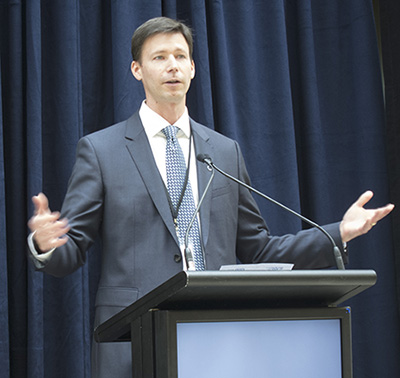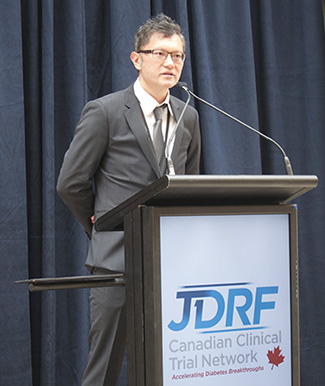Two Faculty of Medicine diabetes researchers are helping to launch the western expansion of the JDRF Canadian Clinical Trial Network.
Timothy Kieffer, a Professor in the Department of Cellular and Physiological Sciences, and Rusung Tan, a Professor in the Department of Pathology and Laboratory Medicine, are two of the three scientists to share in $3 million being provided by JDRF Canada to accelerate translational research into new treatments for diabetes.
The Canadian Clinical Trial Network (CCTN) was launched in 2009 with $33.9 million from the federal government and the JDRF. The WB Family Foundation contributed an additional $3 million in 2012, enabling the expansion of the CCTN beyond Ontario, where it was originally based.
“Canada has played an incredibly important role globally in diabetes research,” said Dave Prowten, the President and CEO of JDRF Canada, at an event held Feb. 13 at UBC’s Life Sciences Centre. “Our researchers discovered insulin. They developed the islet transplantation called the Edmonton Protocol… We’re feeling very fortunate that we’re able support these projects in B.C. and at UBC in particular.”
Dr. Kieffer, a member of the Life Sciences Institute, will explore the potential of using human stem cells to develop into functional, insulin-producing pancreatic islet cells. Dr. Kieffer has already demonstrated that stem cell-derived islets can reverse diabetes in mice, and can even respond to fluctuating levels of glucose in the bloodstream, just as normal islet cells do.
The CCTN funding will enable him to investigate the efficacy of an encapsulation device – which he likens to a “teabag” – that, once transplanted, would enable insulin to flow to and from the islet cells, allowing them to respond to the fluctuating glucose levels while preventing the intrusion of immune cells that would destroy the islets. If it works, it would eliminate the need for insulin injections, or chronic immunosuppression in those receiving transplants.
“We want to cure diabetes,” Dr. Kieffer said. “Not treat it – we want to cure the disease. The beauty of our approach is we can grow enough cells to treat everyone with diabetes.”
Dr. Tan, the Director of the Immunity in Health Disease research cluster at the Child and Family Research Institute, will use the funding to perform human clinical trials on ustekinumab, a humanized monoclonal antibody currently used for severe cases of psoriasis. Ustekinumab inhibits the immune cells that attack the skin in psoriasis, and Dr. Tan and his team are hoping it will do the same with the T-cells that attack the insulin-producing beta cells in the pancreas, if it’s administered early enough. By doing so, Dr. Tan hopes to postpone the need for insulin treatment.
The year-long pilot study will enroll young adults (18 years or older) starting this spring, and will last a year, examining the drug’s safety in diabetes patients and measuring its effect on immune and blood sugar levels. When that is complete, they plan to extend the trial to adolescents, 13 to 18 years old.
“You never really know what research is going to work,” Dr. Tan said. “Unless you spread the net widely, you’re not going to catch that one project that’s going to finally make the breakthrough.”

